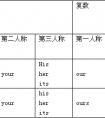用方框中所给单词的适当形式填空。 surprise,him,proud,use,die1.He is very smart and he can work out the problem by_________.2.The girl is very good so her paren-九年级英语
与汉语的比较,有时英语动词的及物和不及物的用法,与汉语的用法不一样,请注意下列两种情况:
a)有的动词在英语里只能用作不及物动词,而汉语则可用作及物动词,如arrive到达,agree同意,listen听。英语里这些动词后面常接介词。如:
We arrived at the railway station at noon.
我们于中午到达火车站。(at不能省去)
(比较:We reached the railway station at noon.)
Everybody listened to the lecture with great interest.
每个人都很有兴趣地听讲课。(to不可省去)
(比较:We all heard the lecture.)
Do they agree to the plan?他们同意这个计划吗?(to不可省去)
b)有的动词在英语里能用作及物动词,而在汉语里则不能用作及物动词,如serve为…服务。
Our children are taught to serve the people wholeheartedly.
我们的儿童被教以全心全意为人民服务
用于be动词之后,实义动词之前。
实意动词的用法:
肯定句:
主语+动词过去式+其它
否定句:
主语+助动词didn‘t+动词原型+其他
一般过去式:
Did+主语+动词原型+其他
考点名称:一般过去时
- 一般过去时:
表示过去某个时间里发生的动作或状态;过去习惯性、经常性的动作、行为;过去主语所具备的能力和性格。
基本结构:
主语+动词过去式+其他;
否定形式①was/were+not;②在行为动词前加didn't,同时还原行为动词;
一般疑问句Did+主语+do+其他。 - 一般过去时句法结构:
肯定形式
主语+动词过去式+其他
例句:She often came to help us in those days.
否定形式
①was/were+not;②在行为动词前加didn't,同时还原行为动词
例句:I didn't know you like coffee
一般疑问句
①Did+主语+do+其他? ②Was\Were+主语+表语?
例句:Did I do that?
用表格整理如下:
记忆口诀:肯定式 疑问式 否定式 疑问否定式 Iworked Did I work? I did not work Did I not work? He(She,It) worked Did he(she,it) work? He(she,it) did not work Did he(she,it) notwork? We worked Did we work? We did not work Did we not work? You worked Did you work? You did not work Did you not work? They worked Did they work? They did not work Did they not work?
一般过去时并不难,过去动作、状态记心间。
动词要用过去式,时间状语句末站。
否定句很简单,didn't 站在动原前,其它部分不要变。
一般疑问句也好变,did放在句子前,主语、动原、其它部分依次站。
特殊疑问句也简单,疑问词加一般疑问句记心间。
最后一条请注意,动词过去式要牢记!
一般过去时中动词过去式变化规则:
词
构成
举例
一般情况
词尾+ed
动词原形
过去式和过去分词
look
talklooked
talked以不发音字母e结尾
词尾+d
like
arriveliked
arrived以“辅以字母+y”结尾
变y为i,再加ed
fly
studyflied
studied以重读闭音节结尾,且末尾只有一个辅音字母
双写词尾+ed
stop
planstopped
planned
结构句型:
1.一般句子
I watched TV last night.
2.一般疑问句
Did you watch TV last night?
3.there be 句型
There was an apple on the table last night.
Was there an apple on the table last night - 一般过去时注意事项:
1.注意主句与从句中时态的一致性
如果主句用了过去时,从句中一般也要用过去式,或者过去进行时、过去完成时等。例如:
He believed that he was right. 他相信自己是对的。
I didn’t know you were here. 我不知道你在这儿。
I thought they were with you. 我以为他们和你在一起。
2.在口语中, 一般过去时并不一定指真正的过去,而只是表示一种礼貌性语气。例如:
I wondered (wonder) if you could do me a favor. 不知你可否帮我一个忙。
I wanted (want) to ask if I could borrow your car. 我想问问可否借用你的车。
I hoped (hope) you could (can) give me some advice. 我希望你能帮我出点主意。
Did (Do) you want to see me? 你想见我吗?
3.used to
used to 是一个词组,表示“过去曾经是……而现在已经停止了”的动作。例如:
I used to work fourteen hours a day. 我过去常常一天干十四个小时。(而现在不这样了)
I used to take a walk in the morning.我过去是在早晨散步。(而现在不在早晨散步了) - 一般过去式用法:
(1)一般过去时表示在过去某个特定时间发生,也可以表示过去习惯性、经常性的动作。
一般过去时不强调动作对现在的影响,只说明过去的事情。
句式:主语+动词过去式+宾语+其它
I had a word with Julia this morning.今天早晨,我跟茱莉雅说了几句话。
He smoked many cigarettes a day until he gave up. 他没有戒烟的那阵子,抽烟抽得可凶了。
(2) 一般过去时常与表示过去的时间状语或从句连用,如:
yesterday,last week ,in the past ,in 1993,at that time,once,during the war,before,a few days ago,when 等等.
(句子中谓语动词是用一般过去时还是用现在完成时,取决于动作是否对现在有影响)。
Have you had your lunch? 你吃过午饭了吗?(你现在不饿吗?)
Yes,I have. 是的,我已经吃过了。(已经吃饱了,不想再吃了。)
When did you have it? 你是什么时候吃的?(关心的是吃的动作发生在何时。)
I had it about ten minutes ago. 我大约是十分钟以前吃的。)
Used to do something 表示过去常做而现在已经停止了的习惯动作。
I used to work fourteen hours a day. 我过去常常一天干十四个小时。
I ate it at 6:45。我在六点四十五分吃了。
(3)带有确定的过去时间状语时,要用过去时。如:
yesterday(昨天)、two days ago…(两天前…… )、last year…(去年…)、the other day(前几天)、
once upon a time(很久以前)、 just now(刚才)、in the old days(过去的日子里)、before liberation(解放前…)、
When I was 8 years old(当我八岁时…)、at+一个时间点
Did you have a party the other day?前几天,你们开了晚会了吗?
Lei Feng was a good soldier.雷锋是个好战士。
注:在谈到已死去的人的情况时,多用过去时。
(4)表示过去连续发生的动作时,要用过去时。这种情况下,往往没有表示过去的时间状语,而通过上下文来表示。
The boy opened his eyes for a moment,looked at the captain,and then died.
那男孩把眼睛张开了一会儿,看看船长,然后就去世了。
(5)表示过去一段时间内经常或反复的动作。常与always,never等连用。
Mrs. Peter always carried an umbrella.彼得太太过去老是带着一把伞。
(只是说明她过去的动作,不表明她现在是否常带着伞。)
比较:
Mrs. Peter always carries an umbrella.彼得太太老是带着伞。
(说明这是她的习惯,表明她现在仍然还习惯总带着一把伞)
Mrs. Peter is always carrying an umbrella.彼得太太 总是带着一把伞。
(表示说话者对这一动作或行为厌烦)
I never drank wine.我以前从不喝酒。
(不涉及到现在,不说明现在是否喝酒)
(6)如果强调已经终止的习惯时要用 used to do(过去常常做,而现在不那样做了)
He used to drink alcohol.他过去喝酒。
(意味着他现在不喝酒了。喝酒这个动作终止了)
- 最新内容
- 相关内容
- 网友推荐
- 图文推荐
上一篇:We all like the boy because he always thinks more of others than _____.[ ]A. himB.hisC.heD.himself-九年级英语
下一篇:选词填空either, his,each, it, something, another, any, himself, both, all, that1. He _____ is very careless. He always makes such mistakes.2. —This sweater i-九年级英语
零零教育社区:论坛热帖子
| [家长教育] 孩子为什么会和父母感情疏离? (2019-07-14) |
| [教师分享] 给远方姐姐的一封信 (2018-11-07) |
| [教师分享] 伸缩门 (2018-11-07) |
| [教师分享] 回家乡 (2018-11-07) |
| [教师分享] 是风味也是人间 (2018-11-07) |
| [教师分享] 一句格言的启示 (2018-11-07) |
| [教师分享] 无规矩不成方圆 (2018-11-07) |
| [教师分享] 第十届全国教育名家论坛有感(二) (2018-11-07) |
| [教师分享] 贪玩的小狗 (2018-11-07) |
| [教师分享] 未命名文章 (2018-11-07) |

![One of the climbers tried to pull ______up the rocks. Finally, he was lucky to get to the top. [ ]A. themselves B. himselfC. herself D. itself-八年级英语](http://www.00-edu.com/d/file/ks/4/2/fanshendaici/2019-12-01/small41ed7588e270175b6fd8ba260e900d321575203896.png)
![Sally buys a watch for father andasweater for_______.[ ]A. she; herselfB. her; herselfC. herself; herD. her; her-七年级英语](http://www.00-edu.com/d/file/ks/4/2/fanshendaici/2019-12-01/small3f1788cd5867bf4768797f36ec9e81961575203859.jpg)


![Don't lose ________ computer games, little boys! [ ]A. yourself toB. yourself in C. yourselves to D. yourselves in-八年级英语](http://www.00-edu.com/d/file/ks/4/2/fanshendaici/2019-12-01/smallce83f3a5e50b48d2e8ee989a20c11b101575203887.png)
